Thanks for your support! If you make a purchase using our links in this article, we may make a commission. And, as an Amazon Associate, I earn from qualifying purchases. See the full disclosure here.
Updated April 4, 2024
As an RVer, there are few things more frustrating than when things in an RV don’t work properly. And, when that thing happens to be your RV water heater not being hot, it’s even more upsetting. No one likes a cold shower!
So, what should you do when your RV water heater isn’t getting hot enough? First, check that the bypass valve is closed. If left open, cold water will mix with hot water, and your water won’t be hot enough.
But, there could be other issues causing this problem, as well. So, let’s look at what to do when your RV water heater is not getting hot enough.
What Is an RV Water Heater?
An RV water heater is different than a residential water heater in that it’s smaller, but the differences pretty much end there. The mechanisms and purpose are the same as what you’re used to at home.
There are two types of water heaters in an RV. A water heater with a tank and a tankless water heater. RVs usually have a tank-style model. Once you turn on the unit, you’ll wait a little bit for the water to heat up inside the tank.
Since most RV water heaters hold about 6 gallons, they can run out of hot water quickly, which is why most folks turn off the water between washing and rinsing themselves.
Tankless water heaters can use gas or electricity to heat the water too. However, in my experience, electric tankless water heaters don’t work nearly as well as gas tankless water heaters.
Tankless water heaters heat the water as it passes through a heat exchanger. When you turn on the hot water at a faucet or shower head, cold water flows into the RV water heater, and a gas burner or an electric element activates the heat exchanger, which heats the water very quickly.
Therefore, tankless water heaters can provide a constant supply of hot water. Below is a diagram of a tankless water heater.
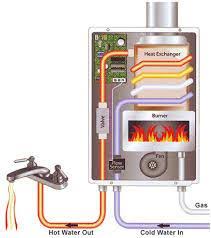
Are RV Water Heaters Gas Or Electric?
Some RV water heaters are gas, some are electric, and some feature both. For obvious reasons, combo water heaters or gas water heaters are much more viable options for boondocking or heading for the hills for a little off-grid, R&R time.
Electric water heaters typically require an Alternating Current, so you’ll have to be on shore power or run it from the generator. Gas with electric water heaters (for the most part) simply uses 12v from the battery for ignition, with gas taking care of the rest.
Much less common is the diesel RV water heater. This is known as “hydronic” heating and, like propane, is best for boondocking and going off-grid. When most RVers think of “gas” water heaters, propane is the lone fuel in their minds. However, diesel is a very high-efficiency fuel and works in conjunction with 12v and/or 24v options.
The high expense for diesel water heaters comes from the often dual or triple roles some of them play. For instance, a Warmda S1250 RV diesel water heater will heat your water, your RV interior, and the subflooring. So, in the future, when discussing gas versus electric RV water heater options, don’t forget about diesel!
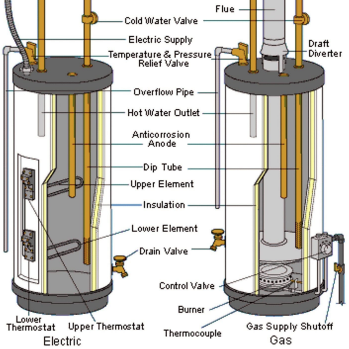
How Long Does It Take for an RV Water Heater to Heat?
It’s helpful to know how long it takes your RV water heater to heat up. If your RV shower water isn’t getting hot enough, it could be that you’re just running the water before your water heater gets a chance to heat it.
Because RV water heaters are smaller than residential units, they don’t take nearly as long to heat up from the start. Let’s take a look at how long it takes some of the most common RV water heaters to get up.
How Long Does It Take a 6-Gallon RV Water Heater to Heat?
Our 6-gallon RV water heater with propane gas takes about 10 minutes to heat up. We only turn on our 6-gallon water heater when we need it, so we don’t waste propane, and it takes about 10 minutes.
However, this may differ for your water heater depending on your heater and fuel source. Gas-powered water heaters heat up about twice as fast as electric heaters. An average 6-gallon water heater will take about 20-30 minutes to heat up using propane gas and about 40-60 minutes using electricity.
As evidenced by our water heater taking about 10 minutes to heat, some water heaters get hot much faster than others.
How Long Does It Take a 10-Gallon RV Water Heater to Heat?
A 10-gallon tank is 40% bigger than a 6-gallon tank, so, therefore, you can calculate it will take about 40% more time to heat up.
That means a typical 10-gallon gas-powered RV water heater will take approximately 30-45 minutes to heat while an electric-powered water heater of the same size might take 60-90 minutes to heat.
Again, your tank might heat faster, like ours does. But if it heats much slower than the times mentioned above, there might be a problem.
How Long Does It Take a Tankless RV Water Heater to Heat?
Tankless water heaters provide endless hot water, but contrary to popular belief, not instant hot water. It takes a minute or two for the heat exchanger to reach its maximum temperature so that it can heat the water quickly enough to keep up with the water flow.
If your shower head is located farther from your tankless heater, it can take a little more time for it to reach your shower.
Many people are put off by waiting for the water to heat up. A gas tankless water heater will heat up faster than an electric one, but with either type, there is a slight wait.
On the upside, once it’s operating at a high temperature, you can maintain a flow of hot water without running out.
This is great if you have full hookups and can continuously drain your gray water tank. But otherwise, you’ll be using as little water as possible, so you don’t fill the gray water tank too fast. If you camp often without hookups, a tankless water heater may be redundant.
How Long Does It Take to Run Out of Hot Water with Your RV Water Heater?
A tankless water heater will theoretically put out hot water forever. But a 6-10 gallon water heater will run out before it has to reheat the water. Once the water in the tank heats up, it should stay that way for a couple of days, ready to give you hot water on demand.
When running continually, like when you’re taking a shower, the hot water will last approximately 10-20 minutes in a 6-gallon tank and 20-30 minutes in a 10-gallon tank.
The flow rate of your shower head will affect this time frame; if it puts out more water, you’ll run out faster than a low-flow shower head.
This is why many RVers who are boondocking often turn the water on to get their hair and body wet, turn it off to lather up, and turn it on again to rinse off. This allows you to get the most out of your hot water without running out too quickly.
If your RV water heater runs out faster than usual, there could be sediment or silt built up inside the tank. The heating element might be heating the build-up rather than the water.
Other problems could occur as well, so if your water heater runs out quickly, consider our troubleshooting tips later on to help you rectify the situation.
RV Water Heater Not Working
Many RVers write into forums asking, “Why is my water warm, not hot?” or looking for an answer as to why their RV water heater is not heating.
Most folks are saying they can hear the propane kick on and run, but they’re getting lukewarm water rather than hot water through their faucets or shower. Luckily, there’s usually a very simple answer to the problem.
Many RVs have a water heater bypass valve. It’s used in winterized RVs and keeps RV antifreeze from entering the water heater. When in use, it will be in the open position so that water goes through the pipes to and from the water heater but not into the water heater itself.
In the spring when the RV is de-winterized, if this valve is left open, the hot water will mix with the cold water supply, resulting in lukewarm water rather than hot water at your faucet or shower head. Check out the diagram below to see a bypass valve setup.
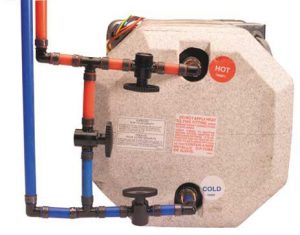
In the picture above, all three valves are in the open position, so the blue cold water line is taking water into the hot water heater. It’s also adding cold water to the red hot water pipe coming out of the water heater.
This valve needs to be closed so cold water does not mix with the hot water coming out of the water heater. Otherwise, you’ll end up with warm water.
Open outdoor shower valves can also cause warm-not-hot water. Most outdoor showers have a hot and cold water valve. When you turn them on, the water mixes between the valves and the shower head.
If you just turn off the water at the shower head and don’t close the valves, the hot and cold water can mix and create warm water inside your RV too.
11 Common RV Water Heater Troubleshooting Questions
If you have an issue that’s a little more specific, we might have some answers. Here are a few troubleshooting guides for various RV water heater problems.
1. Why Do I Have No Hot Water in My RV?
If you have no hot water, the first thing you need to do is check to see if you have gas flow and if the pilot light is on. If the pilot light is on, there could be a problem with the thermocouple. It may not be recognizing that the pilot light is on and therefore will not ignite the gas. The thermocouple may need to be cleaned or replaced.
2. Why Am I Running Out of Hot Water So Fast in My RV?
There are several reasons for not having enough hot water or for running out of hot water too quickly. The reasons could be a malfunctioning thermostat, a broken or damaged dip tube, which would allow cold water to mix with the hot water at the top of the water heater, or having the water temperature set too low.
Sometimes, it just boils down to having a water heater tank that’s too small for your needs. It’s not always practical to install a larger water heater in an RV, so maybe a tankless water heater is the answer.
3. Why Is the Water in My RV Too Hot?
If your RV is in colder climates it’s possible that you have the thermostat set too high. This can occur when transitioning from colder weather to warmer weather months and forgetting to reset the temperature after raising it to account for the colder winter temperatures.
It’s also possible that the thermostat needs to be replaced. You can usually tell if the thermostat is bad by checking the multimeter on the thermostat. It should read close to zero; if not, it probably needs to be replaced.
4. Why Does It Take So Long for My RV Water Heater to Recover?
Consider the times we mentioned earlier for allowing your hot water heater to recover. If your gas water heater recovers much more slowly, the thermostat could be set too low, the burner assembly may need to be cleaned, the propane gas pressure may be too low, or the vent flue may need to be cleaned.
But in most cases, it’s just using water faster than the water heater can heat water. You could try replacing shower heads and faucets with lower-flow models or waiting longer in between uses.
5. Why Won’t My RV Water Heater Light?
If you know how to light the water heater pilot light, but it still will not ignite, there could be several reasons why. There could be air in the gas line, the thermocouple could be loose or defective, the pilot light opening could be dirty, or the gas valve could be broken.
6. Why Won’t My RV Water Heater Pilot Light Stay Lit?
There are few things more frustrating than a pilot light that will not stay lit. Usually, when this happens, it means the thermocouple needs to be replaced. Other likely reasons include a bad gas valve or a partly obstructed vent.
7. Why Won’t the RV Water Heater Burner Stay Lit?
If the burner intermittently goes out, makes an unusually high or low flame, or a whistling sound, it’s most likely because of clogged burner openings. A malfunctioning thermocouple or dirty vent could also cause the problem.
8. Why Does My RV Water Have a Rust Color?
If you see rusty-colored water, it could be the water itself or the anode rod could be corroded. The inside of the water tank could also be corroded, which means you’ll need to replace the water heater.
It’s very easy to replace the anode rod and flush the water heater. We’ll cover that in the next section.
9. Why Does My RV Hot Water Smell Bad?
There are two main reasons for foul-smelling hot water. Either the anode needs to be replaced, or there are bacteria in the water heater tank.
Clean out the tank with a mixture of chlorine and water. If it still smells, you probably need to replace the anode rod.
10. Why Is the Hot Water Pressure Low in My RV?
It’s common for hot water pressure to be lower than cold water pressure, but if it’s really low, there might be a problem. One of the most common problems is a dirty and clogged water filter. You should be changing your water heater filter every six months, so if it’s been a while, that’s likely your problem.
Your water fixtures could also have hard water buildup that slows down the flow of water. Clean them with vinegar to prevent clogging.
Most RV water systems will have a pressure regulator, which protects your plumbing from excess pressure build-up. It should also help to ensure consistent water flow.
If your pressure regulator malfunctions, it could cause water pressure problems. This is a pretty serious problem you’ll want to address quickly before it bursts a pipe.
11. Why Is My RV Hot Water Pressure Only Getting Lukewarm?
Most of the time, lukewarm water is a thermostat problem. Often, your thermostat is simply set too low, so your water doesn’t reach the higher temperature you like. It could also be a faulty thermostat that needs to be replaced.
RV Water Heater Maintenance
The single most important maintenance item for your water heater is to drain it periodically. Draining your hot water heater will help to keep it free of sediment which reduces the tanks ability to heat the water efficiently. To drain the water heater follow the steps below.
- Turn off the water heater (110V and LP) and allow it to cool completely
- Turn off the secondary 110V switch on the back of the water heater
- Turn off the city water and the water pump
- Open the hot and cold water faucets
- Open the pressure relief valve on the water heater
- Once the pressure is reduced, use a 1-1/16” socket wrench and unscrew the anode rod
- Drain the tank completely
- Clean out the sediment at the bottom of the water heater tank using a wand attached to a water hose
- Reinstall or replace the anode rod and use Teflon tape to prevent water leaks
- Do not over-tighten
How Long Do RV Water Heaters Last?
RV water heaters are capable of lasting a very long time. While there are averages and estimates out there (10 to 15 years for a traditional tank water heater and 20 years for a tankless one), the longevity boils down to proper maintenance and preventative maintenance.
In other words, take care of your water heater, and it will last a lot longer. The average lifespans above are beatable by a wide margin. Some RVers have water heaters that are over 20 years old and still running along like they did on the first road trip. As with most things in life, quality does trump quantity, and some of the industry’s top brands are more likely to last.
Unfortunately, the warranty coverage on most water heaters won’t last nearly as long as the water heater itself. So you can’t use the warranty as a cushion to defend against poor maintenance routines and standards. Besides maintenance, making sure your water heater is properly filled is one of the biggest, tank-saving preventative maintenance procedures you can embrace.
How Much Does An RV Water Heater Cost?
On average, an RV water heater will run anywhere between $750 and $1,000. Price is typically associated with size, mechanism of operation, and brand. DSI, or Direct Spark Ignition water heaters, are the most common on the market, followed by pilot ignition and tankless. Propane/electric combination water heaters bring up the rear.
- Direct Spark Ignition: $400 to $550
- Pilot Ignition: $550 to $1400
- Propane/Electric: $450 to $800
- Tankless: $400 to $600
- Diesel: $2,500 to $7,000
Keep in mind that these are just averages based on the current market. You’ll find the price all over the place at times, especially with several brands, types, and sizes available.
Final Words About RV Water Heaters
The RV water heater is an important part of enjoying the RV experience and getting a nice hot shower while on the road. Hopefully, you’re a little better informed about RV water heaters and how to troubleshoot and maintain your water heater.
If you’re ever unsure about what’s causing your water heater to malfunction and you’re not comfortable working with your water heater, please call an RV technician to assess and repair the problem.
Thanks for reading the article! Do you have any water heater advice to pass along? Please leave a comment below.
Related Reading:
– How Much Propane Does An RV Water Heater Use?
– How Much Propane Does An RV Water Heater Use?
– RV Propane Not Flowing? How To Troubleshoot and Solve
– How Long Does an RV Propane Tank Last (Heat, Fridge, Water)
Mike Scarpignato – Bio
Mike Scarpignato created RVBlogger.com over five years ago in 2018 to share all we have learned about RV camping.
Mike is an avid outdoorsman with decades of experience tent camping and traveling in his 2008 Gulf Stream Conquest Class C RV and 2021 Thor Challenger Class A motorhome.
We attend RV Shows and visit RV dealerships all across the country to tour and review drivable motorhomes and towable trailers to provide the best evaluations of these RVs in our blog articles and YouTube videos.
We are 3/4-time RVers who created RVBlogger.com to provide helpful information about all kinds of RVs and related products, gear, camping memberships, tips, hacks and advice.
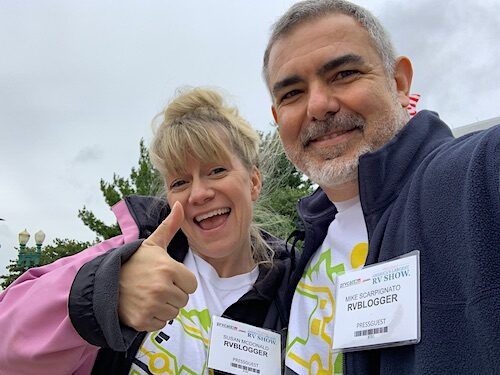

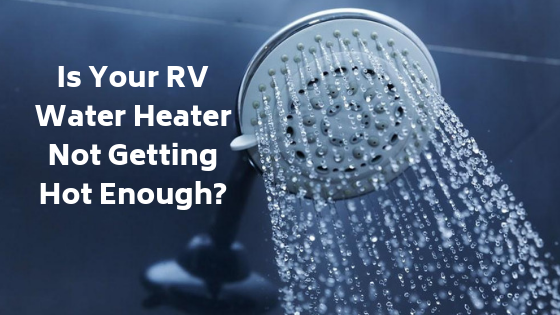
Your water heater may not be providing hot enough water for a number of reasons. One of them, but one that many people ignore, is a filthy thermocouple.
Thank goodness you posted this. I had to replace the floor in my camper, so I removed the water heater. When I reinstalled the water heater I never closed the water bypass valve, so I only got warm water. After reading your post I checked my tank and found the problem. Thank you so much.
We had a not very hot water issue with our RV after reading your info on this site it turned out to be the bypass valve between the hot and cold was open, good info.
Thanks Steve
Thanks Steve!!!
Glad we could help!
Mike
For mostly boondocking, do you recommend the tankless water heater or a traditional one with a tank. It seems to me from this article that I would be wasting water waiting for the tankless water heater to come up to speed and heat the water. In addition to filling out the tank. Should I stick with the traditional water heater for boondocking? I am planning my RV purchase. Thanks!
Hi Mike
We have only warm water….we have replaced the element, thermostat checked the outdoor shower and we only have one bypass valve. Still only warm….both on electric or gas….only thing I can figure is that the bypass valve itself is defective….its plastic in a 2009 KZ on a suburban dual tank….whats your thoughts on this….I am exhausted from overthinking this problem….would appreciate any others thoughts or ideas!! Thanks, Glampin Tee
I had just purchased my 5th wheel, and was only getting warm water, after reading your forum, found out they left all 3 valves open, closed the middle one, and now nice hot water. Thank you!!
Hi Gary,
Glad we could help!!!
Safe travels!
Mike
Hi, I have a 1980 Hilo funchaser, the pilot light and burner are working, I have the faucet running but takes long time to get warm, are there valves somewhere that may be open? I have gas only and use city hookup, any suggestions, thanks 🙏
Thank you, for the information, bypass valve was open, now water is hot.
Great information. Thank you my wife and daughter will have a warm shower. Had forgotten to turn the cold water valve to the hot water heater off. Of coarse I didn’t investigate before my Luke warm shower. Wasn’t for you posting…was going to take to the dealer. Who know what they would of found wrong$$$$ and all it was is a simple turn of a valve.
I really need this kind of information and must share it with my circle. Thanks for sharing this with us.
Hi Mike. I have just been trouble shooting why I was not getting any hot water when on mains. I put in a new anode rod after flushing tank , refilled the tank with RV on mains water then turned on the switch inside of the heater but after 12 hours still no hot water. What I have not read anywhere or received advice of was that under the bed in a lot of RVs ( mine is a jayco) there is a power point with a lead plugged in to switch on and of the heating element for the system. Mine had been turned of at some stage and bingo turn it on and hot water in 15 minutes
Very helpful. For us it was the shower faucet outside that was left on with only the nozzle shut off. Thank you for this post!
Just read article found my bypass valve was open been luckwarm showers for the last month omg fantastic shower tonight thank you soooo much ken h.
Very helpful, thought I had a bad circuit board, but after reading I realized I had left outside shower valves on and that was the reason for only getting warm water. Saved me significant amount of money.
Hi Glenn!
Thanks for letting me know that I helped you save some money! It makes me feel great to know that my articles are helpful.
Thanks for reading the article and for your comment.
Mike
Thank you so much for posting this. I’ve been trying to troubleshoot my RV hot water heater with no luck for a very long time. I’m not a DIY repair type of person and your article was perfect for me. It was easy to follow and to the point, without going over my head. I was able to solve my hot water problem after reading this. Thank You!
Hi Trina,
Comments like yours are what I live for! I am so glad you found my article helpful and practical.
Thanks for visiting the site – keep coming back!
Mike